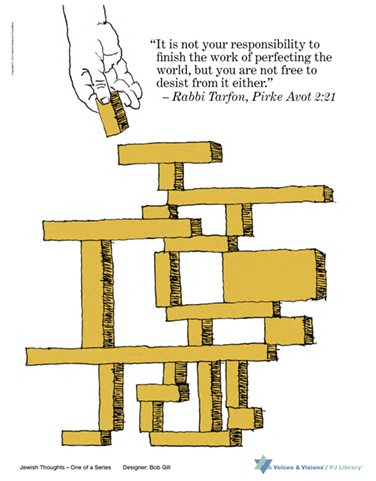
"It is not your responsibility to finish the work of perfecting the world, but you are not free to desist from it either."
-Rabbi Tarfon, Pirke Avot 2:21
Voices & Visions Dvar Torah
Congregation B'nai Torah - Forest Park Minyan (Springfield MA)
Shabbat Ki TeiTzei, August 17, 2013
The Role of Apology in a Precarious World
By Dr. Moses Pava
Rabbi Tarfon’s statement, and the artist Bob Gill’s accompanying image, portray life as precarious and messy. We start the game in the middle, place our piece on top of an existing edifice, and hope for the best. Some of the preexisting blocks seem to be impossibly balanced, one on top of the other, while others are more solidly placed. There does not appear to be any kind of plan here; many pieces seem to be randomly inserted. Presumably, the ultimate point here is to keep the game going as long as possible. Our responsibility is not to complete the precarious task but neither may we desist.
Rabbi Tarfon’s worldview is based on a conception of an imperfect world. Given such a world, it is no wonder that apology and forgiveness necessarily play such an important role. Given that we are just a couple of weeks from Rosh Hashana, I thought it might be interesting to think about the idea of apology, especially from the point of view of contemporary leaders. The whole point of an apology is to allow us to keep working and living together. It is an attempt to increase trust in those situations where trust has been diminished.
To get us thinking more concretely, let me share a couple of real world apologies with you.
When I arrived in Texas in 2001, I felt an enormous amount of pressure. I felt like I had all the weight of the world on top of me and I needed to perform, and perform at a high level every day. Back then, [baseball] was a different culture. It was very loose. I was young. I was stupid. I was naive. And I wanted to prove to everyone that I was worth being one of the greatest players of all time. I did take a banned substance. And for that, I am very sorry and deeply regretful. Alex Rodriguez, 2009
To be clear: the picture was of me, and I sent it. I'm deeply sorry for the pain this has caused my wife, and our family, my constituents, my friends, my supporters and my staff…I lied because I was ashamed at what I had done, and I didn't want to get caught. Anthony Weiner 2011
There is no excuse for that, and I don't ask any forgiveness. Although I may not have intended any harm, I did a great deal of harm. I believed when I started this problem, this crime, that it would be something I would be able to work my way out of, but that became impossible. As hard as I tried, the deeper I dug myself into a hole. I made a terrible mistake, but it wasn't the kind of mistake that I had made time and time again, which is a trading mistake. In my business, when you make a trading error, you're expected to make a trading error, it's accepted. My error was much more serious. I made an error of judgment. I refused to accept the fact, could not accept the fact, that for once in my life I failed. I couldn't admit that failure and that was a tragic mistake. I am responsible for a great deal of suffering and pain. I understand that. I live in a tormented state now knowing of all the pain and suffering that I have created. I have left a legacy of shame, as some of my victims have pointed out, to my family and my grandchildren. That's something I will live with for the rest of my life. Bernie Madoff, 2009
At the time that inappropriate actions by individuals at Yeshiva were brought to my attention, I acted in a way that I thought was correct, but which now seems ill conceived. I understand better today than I did then that sometimes, when you think you are doing good, your actions do not measure up. You think you are helping, but you are not. You submit to momentary compassion in according individuals the benefit of the doubt by not fully recognizing what is before you, and in the process you lose the Promised Land. I recognize now that when we make decisions we risk, however inadvertently, the tragedy of receiving that calamitous report: tarof toraf Yosef, “Joseph is devoured,” all our work is in vain, all we have put into our children has the risk of being undone because of a few well intentioned, but incorrect moves. And when that happens—one must do teshuvah. So, I too must do teshuvah. Rabbi Norman Lamm, 2013
There are all different kinds of apologies: The Conditional Apology. The Begging-for-Mercy Apology. The Pro Forma Apology. The I-am- Going-to-Change Apology. The Let-Us-Together-Reinterpret-What-Happened Apology. All apologies are imperfect. Apologies accompanied with action or promise for action are better, In a litigious society, it's more difficult to apologize – and yet more precious. Apologies are an incredible tool for human progress – we must be careful not to dismiss them too easily. Shouldn't we be more open to forgiving one another? Who knows when we, ourselves, will need to be forgiven. An apology is like placing one more block on the poster's precarious edifice. Done just right, it can move the game along. Poorly placed, it can topple the entire structure.
